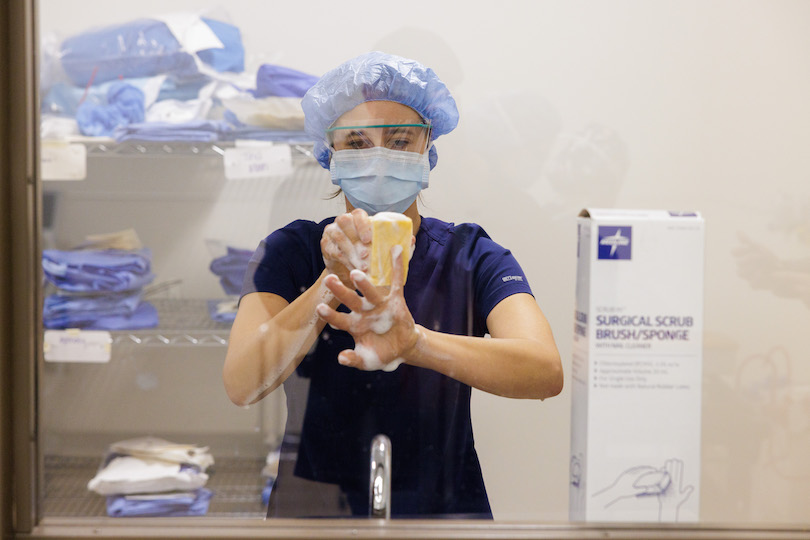Brand Story- With a critical shortage of surgical techs following COVID-19, newly certified professionals can quickly secure jobs at top pay rates.
For students interested in a hands-on career in the medical field, Linn-Benton Community College is introducing an associate’s degree program in surgical technology this fall. The program prepares students to become certified surgical technologists, an in-demand role assisting in surgical procedures.
“Surgical technologists are the eyes and ears in the operating room,” says Rachel Bruce, director of the surgical technology program at LBCC and creator of the program. “We ensure everyone adheres to aseptic technique and operates within the set surgical standards during a surgical procedure.”

As part of the surgical team, surgical technologists perform crucial tasks like preparing the operating room, opening sterile supplies, troubleshooting equipment, counting instruments, sponges, and other surgical supplies, and directly assisting surgeons during procedures. They are the only members of the surgical team that have been specifically trained to maintain the sterile surgical environment.”
LBCC’s ST program was created in response to the law passed by the state of Oregon in 2017, which requires STs to be nationally certified. This means that ST students in Oregon must complete an educational program approved by the Oregon Health Authority to meet certification testing requirements. In 2017, LBCC developed a certificate program with a distance component to better serve Oregonians in rural areas. In 2022, the accreditors, the Accreditation Review Council on Education in Surgical Technology and Surgical Assisting (ARC/STSA), passed a new guideline that all surgical techs graduating from an accredited program must have an associate’s degree to sit for the CST exam. The LBCC program is one of three accredited ST programs in the state of Oregon, and the only one outside of Portland. LBCC’s program stands out with a mostly online curriculum of lectures with once-a-week hands-on lab sessions on campus. Bruce does her best to place students at hospitals and surgical centers for clinical rotations near where the students live, in their community and where they want to work when they’re done.
First-term lecture classes of the associate’s degree program can be viewed in person or via Zoom. Students learn the basics of policies, laws and procedures. After that, the surgical technologist courses have associated lab components. The didactic group (lecture and discussion) is online, and the cohort meets for an in-person lab once a week. During winter and spring term of the first year, students have labs one day a week for four hours. During winter and spring terms of their second year, students get placed at surgical facilities to complete a required practicum. This opportunity enables students to apply what they have learned in class and lab to real surgical cases. Students are supported by preceptors (experienced STs who monitor, direct, and guide them), and the hands-on experience gained is incredibly valuable.

“Again, the didactic is online but the lab classes are stacked so a student can come to campus just once a week and not have to spread the commute over multiple days,” says Bruce. “When creating the associate degree program, I did try to make it as distance friendly as possible. It makes it much easier for those who can’t relocate during the program.”
With a critical shortage of surgical techs following COVID-19, newly certified professionals can quickly secure jobs at top pay rates.
“Employers are offering major incentives like sign-on bonuses and tuition reimbursement because the demand for surgical technologists is so high right now,” Bruce notes. “My students are getting hired right out of school making around $35 an hour.”
Students can choose from many different schedules, from days to swings to nights to weekends, and can also receive per diem payments or relocation bonuses.
“There’s a huge variety to choose from and you can work the way you want to,” she says.
Bruce herself is a 24-year veteran of the operating room. She grew up in Oregon but moved to Salt Lake City, Utah, for school, then moved back. After working per diem at a local surgery center for five years, she was recruited to help complete the final cohorts of the certificate program and then build and start LBCC’s ST AAS, associates of applied science, degree program. Bruce says that people who have an interest in health care find the career path to be a very rewarding one, and it’s also one that allows people to participate in surgery without having to go to medical school or have other responsibilities that they may not want, such as dispensing medications. Surgical technologists don’t have to spend time filling out paperwork like many other medical professions do — their participation is in-the-moment in the operating room.

Surgical technologists are allied health professionals who are an integral part of the team of medical practitioners providing surgical care to patients in a variety of settings. A surgical technologist works under the supervision of a surgeon to ensure that the operating room or environment is safe, that equipment functions properly, and that the operative procedure is conducted under conditions that maximize patient safety.
“While we are participating in the surgery, we are the ones that are making sure the doctors are moving the way that they need to move, by turning back to back when they’re passing something, and that unsterile items aren’t being opened onto the field,” Bruce says. “And then we do counts throughout the case to make sure that all needles, all sponges, all instruments are kept track of.”
The OR has its own language and environment and you’re always learning something new, she says. “Surgical technology allows you to directly participate in innovative, life-saving procedures every single day.”
For more information on Linn-Benton Community College’s Surgical Technologist Program, visit www.linnbenton.edu/surgical-technologist
Brand stories are paid content articles that allow Oregon Business advertisers to share news about their organizations and engage with readers on business and public policy issues. The stories are produced in house by the Oregon Business marketing department. For more information, contact associate publisher Courtney Kutzman.



